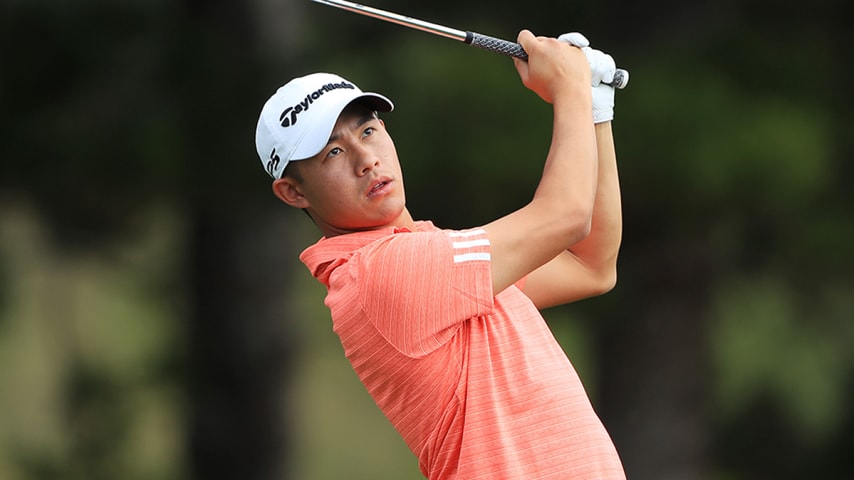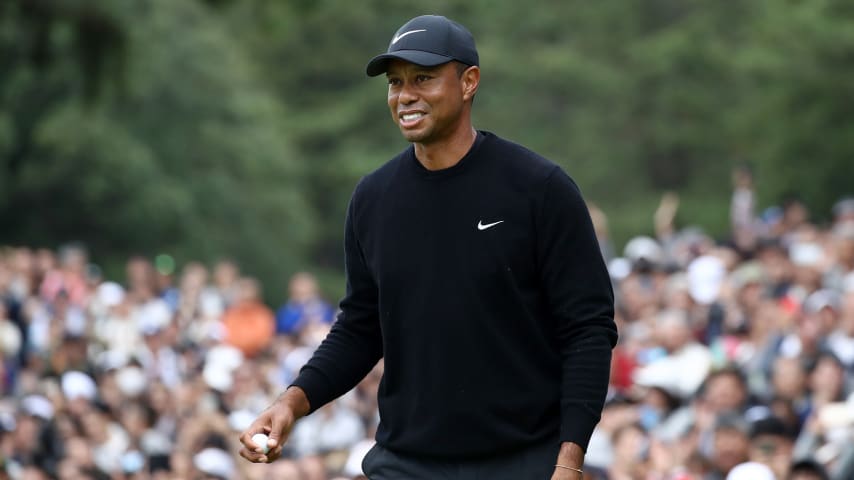Collin Morikawa has a golf IQ beyond his years
9 Min Read

KAPALUA, HAWAII - JANUARY 02: Collin Morikawa of the United States plays his shot from the second tee during the first round of the Sentry Tournament Of Champions at the Kapalua Plantation Course on January 02, 2020 in Kapalua, Hawaii. (Photo by Sam Greenwood/Getty Images)
Collin Morikawa, one of the PGA TOUR’s newest stars, has a golf IQ beyond his years
Written by Cameron Morfit
Collin Morikawa, one of the PGA TOUR’s newest stars, has a golf IQ beyond his years
The Cal Bears had done fine, under the circumstances.
Missing two players, one of them at Mackenzie Tour-PGA TOUR Canada Q School and the other tending to a family obligation, the Bears finished fourth at a tournament at rival Stanford last March. The prevailing drift: Fourth wasn’t bad, all things considered.
Collin Morikawa wasn’t having it.
“He called me out on it,” recalls Cal men’s golf coach Walter Chun. “It was one-on-one, very respectful. He taught me a lot about being a coach. He’s so driven; it’s part of what made him the player he was, and what makes him the player he is.”
To wit, Morikawa could have been content, upon getting his Business Administration degree at Cal last spring, to aim only for a spot in the Korn Ferry Tour Finals. Instead, he finished T2 at the 3M Open in just his fourth PGA TOUR start as a professional, earning Special Temporary Member status, and won the Barracuda Championship three weeks later, qualifying for the Sentry Tournament of Champions (T7 last week) and earning a two-year exemption on TOUR.
Morikawa, who joined Cameron Champ, Adam Long and Matthew Wolff as players to win last season in their ninth career start or earlier, will be among the players to watch at this week’s Sony Open in Hawaii. His paternal grandparents were born in Maui, and he spent so much time in Hawaii growing up, on family visits and for other special occasions, he says he feels right at home.
His control game might be a better fit for cozy Waialae Country Club than Sentry’s brawny Kapalua, and it speaks to his lofty reputation that no one would be shocked if he wins. That goes for this week, and most any other week, too.
“There are no holes in his game – at all,” says Maverick McNealy, a rival when he was at Stanford, a teammate when they played in the Palmer and Walker Cups, and now a pal with whom Morikawa plays when home in Las Vegas. “He’s very nice, respectful, humble. But I think that humility comes from confidence.”
How good is Morikawa? At the fall’s Safeway Open (T10), he shot a second-round 64 in which he made seven birdies from inside 10 feet. Had he played enough rounds to qualify for statistical rankings last season, he’d have led the TOUR in Strokes Gained: Tee-to-Green and also been in the top 10 in Driving Accuracy, Greens in Regulation, and Strokes Gained: Approach the Green.
Says college coach Chun: “I think he’ll win at Torrey Pines or Riviera to start the year. He’s a West Coast kid, he knows poa annua greens, and he’ll be motivated to win. When he wants to accomplish something, he tends to do it.”
Only occasionally do you remember that he’s only 22, and graduated just over six months ago. Asked why he was looking at his phone after round three of the Safeway, Morikawa replied, “I’m just looking for what my next pairing will be. It’s still exciting for me.”
It might be the only time Morikawa has looked or sounded like a newbie.
The head of a caddie
J.J. Jakovac won two individual national championships for Division II Chico State. He turned pro, didn’t get through Q School, burned out, and took a job with Ryan Moore. They lasted 7-1/2 years, parting at the PGA Championship last May. Jakovac went home to Napa, California, where he bonded with his 1-year-old son, Bo, as his wife returned to work. He was in no hurry to get back on TOUR.
Talents like Morikawa, though, come along all too infrequently. A three-time first-team All-American, he almost won a Korn Ferry Tour event as an amateur, losing a playoff at the 2016 Air Capital Classic. And by May he was ready to go pro.
Figuring he was already too late to get the bag, Jakovac, 37, asked an agent friend to help him reach out to Morikawa’s nascent team.
“I got very lucky,” Jakovac says.
They met at the U.S. Open sectional qualifier in Columbus, Ohio. Morikawa advanced (he later finished T35 at Pebble Beach), and their partnership was born.
“The best thing about him is his head,” Jakovac says. “I know the courses, but he thinks like a caddie out there, which is cool. He doesn’t play too conservative; he plays smart. He’s very methodical about the way he plots it around.
“I was saying this to someone,” he adds, “and they said, ‘So he’s like a 10-year veteran.’ I said, ‘He’s better than most of those guys.’ In the mental aspect.”
Morikawa was asked about this at Kapalua last week. How did he explain his early success, plus that of Wolff, Joaquin Niemann and others? “It’s just a lot of self-belief,” he said. “We believe that we can do it no matter where we are.”
To make a food analogy – Morikawa calls out great meals on social media and carries wedges stamped with SOURDOUGH TOAST, BACON, HASH BROWNS and EGGS BENEDICT – if most new pros are a bunch of promising ingredients, then Morikawa comes hot out of the oven with everything baked in.
“He was destined to do this,” says Steve Desimone, Cal’s longtime men’s golf coach, who helped recruit Morikawa before leaving the job for health reasons.
Desimone, who was at Berkeley for more than 37 years, calls Morikawa “mature beyond his years” and, tellingly, “the easiest kid I ever coached.”
Which begs the question: How did he get so golf-smart? How is it that his golf IQ recalls another product of the Southern California golf scene, Tiger Woods? To answer that, you have to talk to Rick Sessinghaus.
An unusual path
Morikawa’s younger brother, Garrett, 16, is into soccer, not golf. Their parents, Blaine and Debbie, weren’t accomplished players, either. “It’s kind of my own thing,” Morikawa says of golf. “My first lessons were at this mini junior camp at Scholl Canyon in Glendale, the city over from where I grew up. I was 5.”
He got the basics from a married couple who taught juniors, but he always noticed the other instructor there, a man on the other end of the driving range. Sessinghaus. He taught better players, and soon enough, Morikawa was tabbed as one of them.
“He had some good fundamentals coming to me,” says Sessinghaus, who has a doctorate in sports psychology and is the mental performance coach for UCLA’s golf team. “I work heavily on the mental side and course management and strategy.
“With Collin, at an early age, we were doing a lot of our lessons on the course.”
What was the percentage shot? Where was the best miss? How could he play to his strengths? More than mechanics, these problem-solving sessions became the focus.
“There’s a lot of great swings out there but not many golfers,” Sessinghaus says. “He learned to play at a high level. Collin’s been wired that way; I’ve tried to cultivate it, raise his golf I.Q. by putting him in different situations.
“He’s going to look at a golf course and create a strategy based on his capabilities. He’s not going to overpower it but can plot his way around based on his strengths.”
From age 8 through high school, Morikawa met with Sessinghaus weekly. (When he went to Berkeley, they sometimes worked over the phone.) Morikawa’s swing was so fundamentally solid, they put even greater emphasis on the mental side.
The on-course problem-solving wasn’t just a series of theoretical exercises; as much as he could, Sessinghaus tried to create the stress of actual competition.
“I believe development has to be done on the golf course to learn how to compete, to deal with pressure, to learn how to think,” he says. “The competitions at the end of a lesson were, ‘Hey, you have one ball and one ball only, let’s see what you do.’
“It was a bunker shot,” he adds, “closest to the pin, a wedge off a downslope, a par 3. A lot of it was trash talk. You’d win and say, ‘OK, I got you.’ It was about the contest itself. That was a constant for us, competition. I probably won more at the start and then when he was 16 or 17, it turned quickly.”
A prized recruit, Morikawa nevertheless got to Cal only to find out his short game was lacking. He worked on it until it was TOUR-quality. He became the No. 1-ranked amateur, turned pro, and won in Reno in just his eighth start, closing with three straight birdies to beat Troy Merritt in the modified Stableford format.
Surprising? Not really.
Sessinghaus has never seen Morikawa look out of sorts in the heat of battle. Well, almost never. When the new TOUR winner was tabbed to throw out the first pitch for his beloved L.A. Dodgers last Labor Day, he was edgy. His mom, dad, brother, girlfriend (Katherine) and manager waited patiently as he walked out to the mound.
That caddie Jakovac, a devout San Francisco Giants fan, was probably going to give him the needle if he made a lousy throw probably didn’t help, either.
“That was the first time I’ve seen Collin nervous,” Sessinghaus says with a laugh. “It was kind of fun to see that vulnerable side of him; this was totally outside his comfort zone. In warm-ups he was doing fine, but when the pitch came, he threw it into the dirt a little bit. We had fun with that.”
For now, he’ll stick to the golf course, where Cal’s Desimone says he’s never seen Morikawa pick a wrong club, and never seen a player with better distance control.
Where will he pick up win No. 2? With Morikawa’s mindset, it could be anywhere.
“I think a lot of people aren’t embracing competing to be great and to win,” says Sessinghaus. “We’ve watered it down to, Let’s just try our best. I get that, but Collin has always believed he could win. Talking with J.J., his game sets up for 90% of the courses he’s going to play because he hits it so well.
“There may be a couple bomb-and-gauge courses where there’s no consequences for a miss,” he adds, “and at those ones he might not have as good a shot, but other than that, he’s going to have a shot to win every time.”










